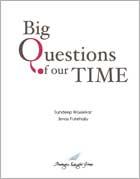Can We Challenge Our Ideas?
 |
February, 2009
By Sundeep Waslekar
|
Ideas predate civilization. They even predate humanity. The ideas of fire, weapons and symbols were probably thought of by Homo erectus before the birth of Homo sapiens. However, lately some of us tend to believe that we don�€™t need to evolve our ideas. The concept of �€˜end of history�€™ basically means the end of evolution of ideas. It is rather stupid to declare some idea to be so good and so ultimate that we don�€™t need any better idea. About twenty years ago, Francis Fukuyama proclaimed free enterprise and democracy to be the ultimate ideas with which the progress of humanity would culminate. I wonder if he and his followers are following these days how the market is begging the state to save itself.
When we give up arrogance and challenge our long-held beliefs, human civilization makes progress. One of the most enduring ideas is the idea of God. It predates religion. It pervades all societies all over the world. It is responsible for a lot of bliss, business and bloodshed even today. Yet it has changed over the last few hundred years. The ideas of reformation, revolution and experiment have demolished the monopoly of God on the human thought, though not God itself. In fifteenth or sixteenth century Europe, I would have been called before Inquisition for writing this paragraph. The fact that I don�€™t have to worry about such things in the twenty first century marks the progress of free will.
Another idea that has gone through transformation is the idea of weapons. Our Homo erectus ancestors probably discovered the concept of weapons exterior to our beings, when they used stones to secure food. Since then weapons have become more and more lethal. The present stockpile of weapons can not only destroy humanity but also prevent the birth of posterity for a few centuries. However, the concept of weapons has also evolved to include the use of diplomacy and development in order to win an enemy. Josef Nye has given us the idea of �€˜soft power�€™ which advocates the use of instruments of persuasion rather than destruction as weapons of modern states. China is an ambitious practitioner of this concept. The Chinese government is funding the creation of several hundred Confucius Institutes all over the world.
The idea of �€˜nation�€™ though a rather new one is already going through change. Since the idea of nation is closely associated with the idea of sovereignty, we can say that the countries of the world can be divided into pre-sovereign entities, sovereign nations and post-sovereign unions. I must admit that this is not my original thought. I recall reading somewhere that someone �€“ whose name I can�€™t recall �€“ has come out with a book that divides nations into pre-modern, modern, and post-modern. I believe that sovereignty rather than modernity is a more appropriate parameter to categorise the growth of nationhood.
There are several books and essays on the history of ideas. Felipe Armesto has written one in a very reader-friendly style with a lot of pictures and illustrations. The very first idea he lists, dating half a million years ago, is the idea of cannibalism. Some of the latest ideas he lists are the ideas of environmentalism, universal welfare and cultural pluralism. Humanity has advanced in its movement from cannibalism to cultural co-existence. However, it has not completely given up the original instinct that lured our ancestors at various stages to the ideas of cannibalism, slavery, colonialism and Apartheid. Therefore, we live an era when God can bring us bliss as well as bloodshed and we as much face the risk of extinction at the hands of our fellow human beings as the prospect of welfare of the least privileged among us.
In the daily humdrum of managing our love and enmity portfolio, deluding ourselves by collecting hundreds of �€˜friends�€™ on Facebook, following the life of movies stars and saving to buy the latest car, we may treat the given as given. And therein hides the risk of our accepting ideas as they are, and allowing those with vested interests to manipulate them. It is this complacent attitude that can take us closer to precipice. If instead, we want to benefit from the promise of progress, it is necessary for us to examine our long-held ideas and reshape them. Our future will be determined by our willingness to question ourselves.
Related Publications
-
.jpg&maxw=50)
Big Questions of Our time: The World Speaks, 2016
Download:Big Questions of Our time: The World Speaks _Full Report
-

-

Second Freedom South Asian Challenge 2005-2025, 2005
read more
Download:Second Freedom South Asian Challenge 2005-2025 Full Report
Related latest News
Related Conferences Reports
-

Global Challenges Conference, October 2016
Download:Global Challenges Conference Report
-

Conference on Responsibility to the Future: Business, Peace and Sustainability, June, 2008
Download:Global Security and Economy: Emerging Issues


